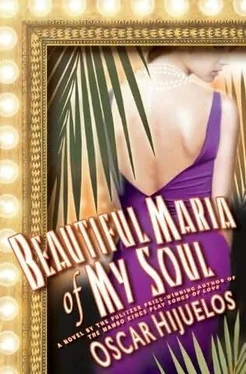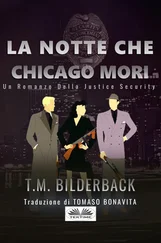After seven, however, as the shadows elongated in the streets, the prostitutes started to wander in with their fellows, earnest cubanos for the most part, trying to get in a leisurely romp before heading home, as well as some lower-end turistas, who couldn’t help but smile at the young beauty sitting by the old biddy. Of those prostitutes, the oldest and most regal, a certain Violeta, whose mouth seemed fixed in a perpetual scornful smile, had taken a liking to María-“If you ever want to come work beside me, let me know. Men would like you very much”-and on occasion, when she wasn’t breaking wind on the stairs, this Violeta-“Ay, Teresita, she was a whore, but a sweet one”-brought María (and la señora) a bag of greasy meat pastries from a cart on the street and sometimes a cup of fruit-syrup-drenched ice, succulent, chilling, and cleansing. On her way up, she always pinched María’s chin, as if she were an older sister, and sometimes, for the hell of it, she’d slap her bottom, whistling and, often enough, reminding her: “I’m telling you, querida, men would pay to have a taste of this.”
Then came another day when Violeta walked into the lobby with a thin gent, sad faced as José Martí, apostle of Cuba, that fellow, with one dormant eye-made of glass-pulling along a clattering black trunk on wheels, which, as it happened, carried the tools of his trade: a large box camera and various lights. Nearly falling over at the sight of María, who had been filing her nails in the stairwell shadows as they came in, he consulted with the prostitute.
His name was Enrique.
“My friend here,” said Violeta, “would like to take your photograph, María, to display in his shop window… He’ll pay you a few dollars for your trouble, and who knows what other pictures he’ll want to make…”
Knowing the score, Violeta winked, as if it would be easy-every few months or so she herself posed for this fellow in her room upstairs, at a time of day when the windows flooded with light. Violeta sprawling naked on a bed, Violeta spreading wide her legs, her hairy bush and glinting Venus mound laid bare for the world to see, such shots to be sold as “artistic” photographs out of the back of his shop or by old lottery vendors on the street. Violeta was already mildly famous among the brothel set for an accordion collection of such postcard-size photographs, circa 1933, which she had posed for as a ravishing fourteen-year-old girl, new to Havana and willing to do most anything for money. And so why wouldn’t María? The pay would be helpful, and she simply hadn’t had many photographs taken of her back in her valle; but there was also something about the photographer’s somewhat shattered, world-weary manner that immediately put María at ease. He seemed a harmless sort, one of those habaneros, as Violeta would say, who had fallen through the cracks of life but managed to survive anyway, without hurting a soul.
And so a few days later, María, having agreed to sit for the photographer in his studio, over at 17A Obispo, set out in the late morning, the ladies of the hotel, Violeta among them, having fussed over her. It was the first time she’d ever had her hair set in curlers, or worn makeup-not that she needed it-and though the face powders and lipstick seemed oddly confining, as she sauntered along those streets, the perfection of her features, along with the grandeur of her figure, stopped more than one habanero in his tracks: at the sight of her, grandly dressed Negroes, dapper in white from head to toe, bowed, smiled, and tipped their hats her way, as if, in fact, they felt blessed to see the most beautiful woman in Havana passing before their eyes.
At first as she sat before him, in her only good dress, María’s formal side took over. Not a jamoncita-a ham-at all, when he asked her to smile, she could barely manage. For his part, he didn’t really care but put on a show of fumbling about with his camera, making absurd faces, and, with every phrase, praising María’s natural gifts. He, with his one dead eye, allowed the other to swim in hers-dark as opals, almost feline, and mysteriously alluring. “My God,” he kept saying, “the more I look at you the more beautiful you become.” It took him a while, but, as he went about the tedious process of making shot after shot-he used plates-all the while telling her the story of his life-no wife, no family, and never as much as a novia to care for him-his sad and tender manner touched her. No wonder Violeta trusted him. And suddenly she did too, for after an hour or so, María, who’d always mourned the carcasses of dead birds in the countryside, felt that she wanted to make that poor soul happy; and then, finally relaxed, she smiled in a way that seemed beatific.
After a while she began to enjoy the whole business, and got to the point that she didn’t mind it when Enrique, thinking about a sale to a magazine, asked her to put on a bathing suit-he had racks of all kinds of dressing items in the back. Going behind a Chinese screen she squeezed herself into a blue one-piece and then posed, under the heat of those lights, stretched out like Goya’s Maja on a settee. No comment about her lusciousness would suffice, but it should be said that Enrique, long accustomed to photographing the women of Havana, in various modes of dress and undress, would have gladly dallied that whole afternoon, luxuriating in the viscous femininity that, in the heat of that room-and it was ridiculously hot-escaped like perfume from her skin.
That, however, was not the photograph he would choose to put in his window. That same afternoon, he posed her in a virginal white lace wedding dress, María clutching a bouquet of roses to her breast, and supposedly dreaming about love. That black-and-white image, of María, her dark eyes looking imploringly out at the world through a lacy veil, soon graced the second tier of the photographer’s window, and, wouldn’t you know it, as María would tell her daughter one day, men gathered before that display just to get a second and third look of her daily.
“There are women who think they are beautiful,” she once told her daughter, “and while they may be pleasant in some ways, real beauty doesn’t come along too often.” She’d laugh. “That real beauty was me, even if I didn’t know it, back then.”
With so many men stopping into the shop to inquire about the “pretty girl,” it wasn’t long before that face caught the attention of one Rudy Morales, the photographer’s friend, who happened to own a cabaret on one of the side streets off the Prado, the Monte Carlo. It was Rudy who gave María her first dancing job, her audition held in the Lysol-scrubbed reception area of the hotel. Matilda turned up the radio, and to the music of el Trío Matamoros, María performed in the rumba style of her childhood, so fluid, so Congolese, so rapturously sensual-and sexual-her hips swaying so convincingly and her skin giving off a feminine scent so profound that, how to put it, Mr. Morales, the sort to wear dark glasses in the middle of the night, breaking into a sweat, decided to hire her on the spot. “I would have given you a job just because of the way you look,” he told María. “But I’m happy to see that you can actually dance, and beautifully.”
Within a few days she had joined a chorus of seven dancers, the stage shows dominated by the fabulous Rosalita Rivera (from whom María would borrow her stage surname), an affable third-tier star on her way down from a not too glorious height, with thighs and belly far too fleshly to be appearing in the spare costumes those shows required (she was, of course, the owner’s mistress, bedding him at his convenience in the small flat he kept upstairs). The club itself, like so many María would work in, was a dump, selling water booze to a clientele of mischievous-minded tourists and servicemen, out for a night of oblivion and tarty entertainment. Its amenities were not elegant-its toilet was a disgrace, and their dressing area, with its speckled mirrors and pungent odors, of leaking pipes and kitchen grease, saw as much traffic as a street corner, the house band’s musicians, waiters, and busboys drifting by their tables casually, as if, in fact, the ladies were wearing something more than just panties and brassieres, sometimes less. (“Get used to it,” Susannah, one of the nicer dancers, told her as María scrambled to cover up her breasts when one of the musicians, a fellow named Rodrigo, happened by and, getting an eyeful of her nicely taut nipples, winked.)
Читать дальше












